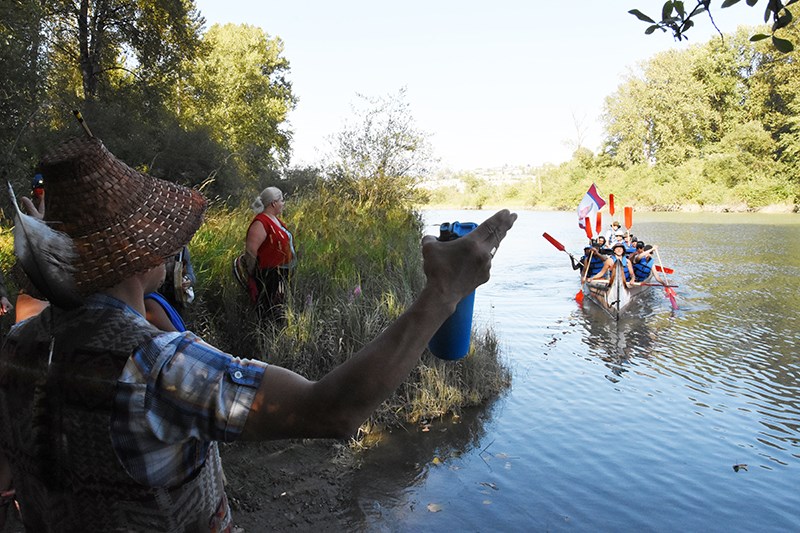On a warm day last week, 10 young adults stepped onto the shore of the Kwikwetlem First Nation, muddy, tired and hot.
While Chief Ed Hall greeted them in his Halq'emeylem language and drummers sang and beat a welcoming song, the group landed a sturdy Voyageur canoe in the shade of alder trees, their paddles raised in respect,
If it wasn’t for the sound of cars in the distance seeking a quick way home on the Mary Hill Bypass, the scene would have appeared to be from a history book or at least a less-travelled part of B.C. — not a busy Metro Vancouver suburb.
The group had spent the last three weeks travelling the Fraser River and had plans to camp on the shores of the Coquitlam River, next to the popular Colony Farm Regional Park, and were the guests of Chief Hull, who would be supplying salmon for the potluck dinner.
“It’s heartwarming,” Hall said as he acknowledged the work of the Sustainable Living Leadership Program (SLLP), an initiative of the Rivershed Society of BC, which encourages young people to create projects to help restore the salmon river while they travel its 1,400-km length.
A passion project of Port Moody-Coquitlam MP Fin Donnelly, who was among the crowd of well-wishers, the SLLP has been operating for seven years, raising awareness about the need to take action to preserve the river and its tributaries.
Now, as Donnelly is about to retire as MP, with just a few months left until the Oct. 21 federal election, he remains excited about the program and the importance of encouraging young people to take an interest in environmental stewardship.
“Our climate is changing,” he said, “and we need these young leaders in every community.”
As they paddled the Fraser, program participants met various groups, learned about the issues and worked on their own projects, which could include organizing other river paddles, such as one that recently took place on the Nechako River, to photo contests to encourage people to take an interest in the Fraser River.
Donnelly, who is working on a business plan to raise $500 million for Fraser River restoration projects, including $350 million from the federal government, told The Tri-City News the Fraser River is facing many difficult issues, such as climate change, pollution and habitat loss.
Salmon runs aren’t as plentiful as they once were, requiring a deeper focus, he said, pointing out the efforts to transport salmon blocked by a rock slide near Big Bar, north of Kamloops, as an example of what can be done if people work together.
He said he's hoping SLLP participants will take up the efforts to protect the Fraser River watershed, with what he calls CPR projects — conservation, protection and restoration.
“It’s a health term we think needs to apply. We’re in a crisis. The salmon are struggling and we need to apply these strategies to their survival.”



